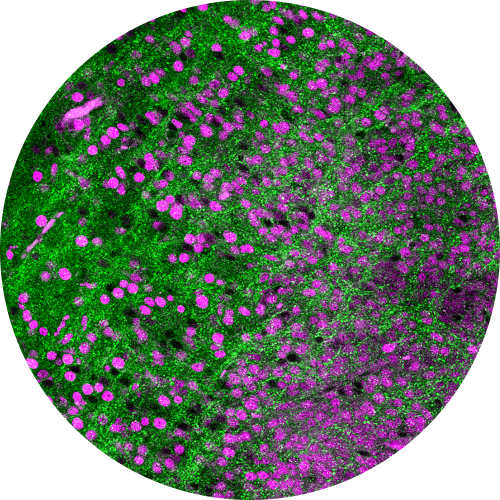
Elizabeth Brockman. Illuminating the mechanisms of synaptic and neural network dysfunction in a new in vivo model of Down syndrome
Motivation
Down’s syndrome (DS) is a common neurodevelopmental condition and a major cause of congenital intellectual disability. Advances in our understanding of the underlying cellular and molecular mechanisms have been hampered by the limited availability of model systems that recapitulate this complex chromosomal condition. Using a novel system to model human neuron dynamics, we recently showed that synaptic structures, the point of contact between neurons, are less dynamic, and that neuronal network activity is less synchronous in DS (Real et al. Science 2018). Both these factors could contribute to cognitive deficits in DS.
Research Challenge
We want to deepen our understanding of the dynamics of synapses and neural networks in DS. Specifically, the ESR will investigate the mechanisms of the DS synaptic and activity deficits by using transplanted human-derived neurons, longitudinal multiphoton structural and functional in vivo imaging, rabies tracing, slice electrophysiology and molecular analyses. Our ultimate aim is to better understand the synaptic basis of the DS cognitive symptoms and guide the development of therapeutic strategies. Human induced pluripotent stem cells (iPSCs) hold great promise for modelling neurodevelopmental brain conditions such as DS.
The group of Synaptic Plasticity and Repair led by Dr. Vincenzo De Paola at the Imperial College London pioneered a study where neural progenitors derived from iPSCs of individuals with DS were transplanted into the brains of adult mice to visualize how resulting neurons grew and connected, using intravital imaging (Real et al. Science 2018). The ESR will also benefit from the expertise on super resolution microscopy at the IINS in Bordeaux (secondment institution) to analyse the molecular changes in DS synapses.
Supervision and Secondments
The PhD project will be carried out in Vincenzo De Paola’s laboratory at the Imperial College London (ICL). The ESR will enrol in the Centre for Doctoral Training (CTD) Programme at Imperial. The project also features secondments (extended stays) at IINS-CNRS (Daniel Choquet, Laurent Groc), CHUC (Guiomar Oliveira) and Lundbeck (Kjartan Herrik).
Supervisor: Vincenzo De Paola (vincenzo@imperial.ac.uk)
Host Location: Institute of Clinical Sciences, Imperial College London, London, United Kingdom.
< return to list of available projects
